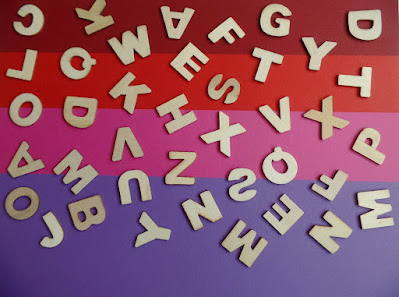Many years ago, I knew a woman who'd recently become a Christian. Her first Bible was written in a fairly easy-to-read translation, and she enjoyed reading it. She could understand it. Then one day, I was attending a Christian talk with her, and the speaker made a couple of throwaway comments about this particular version of the Bible. He didn't like it because of a couple of points in the translation. His talk wasn't about Bible translation. He wasn't aiming his comments directly at my friend. He simply dropped those couple of snippets and moved on. But they had an effect. My friend got the impression that she didn't have the 'right' Bible and that she needed to get a 'proper' Bible.
I was annoyed at the time, and I'm still annoyed more than 30 years later. Why? Not because of some finer points of Bible translation, but because this Bible was at a reading level that was comfortable for my friend. Many people have been blessed by this Bible, it sells millions each year, and I have a copy of it next to my bed that I read every night. It's not my main study Bible, but I enjoy reading it. Why put unnecessary barriers in front of people that would make it hard for them to read and understand God's Word?
When looking at children's literacy, we understand that there are a range of different reading levels, and there are different kinds of books that cater to this. However, when we see an adult, especially in Western culture, we assume they can read and do so at a reasonable level.
My view of this was challenged recently when I watched an excellent SBS documentary series called 'Lost for Words'. Across three episodes, it followed eight adult Australians with literacy challenges. Two of them could only recognise a few sight words. The others could read a bit, but had trouble with a lot of everyday reading tasks that most of us would take for granted; such as reading a public transport timetable, sending an email or looking for ingredients in a supermarket. They were placed into an intensive reading program, and it was amazing to see their progress over the course of the series. If you're in Australia, you can watch the series on SBS On Demand.
When we write for adults, do we assume everyone has a high reading level? Do we dig out the thesaurus to find fancy words? When writing Christian books, devotions and study guides, do we use Christian jargon that a lot of Christians wouldn't even understand? Do we see an adult reading a comic book and secretly think they should have left those behind in childhood? Do we inadvertently leave people out of 'the conversation' because they can't read it and understand it? I'm talking to myself here as much as anyone.So What Can We Do?
- Many people with reading challenges have been shamed in the past and have become adept at hiding their gaps in literacy. Let's watch our own attitudes, expectations and stereotypes and try to create an atmosphere in which people with literacy challenges feel accepted rather than further shamed or stigmatised.
- Think about our audience. Are they people with theological degrees? People who've successfully completed high school? The average person on the street? That 'average' person may be someone with a learning disability, someone who has English as a second language, someone who had disrupted schooling due to family trauma. How do we craft our words so that we don't exclude people?
- By all means use a thesaurus to help you think of other words for variety or for different shades of meaning. But don't use a thesaurus to come up with highfalutin words that make you look clever without regard for the reader. (Actually, 'highfalutin' might be one of those highfalutin words!)
- If you have to use an unfamiliar or technical term, use context to help the reader grasp what you mean. For example, if you're writing a book set in the 1800s, you might want to use the term 'portmanteau' rather than 'suitcase', as it's more historically accurate. However, you can help the reader by hinting at its use. For example, 'Helena packed her clothes in the new portmanteau she'd bought for the trip.' If you have a lot of technical terms, you could also consider using a glossary. It's not about 'dumbing down'. If we believe God wants us to share his love through our stories, memoirs, poetry, devotions and more, shouldn't we do our best to make our words clear?
- Think of alternative ways of presenting your material. For example, audiobooks are wonderful for people who find reading difficult. However, you still need to make the language accessible. Depending on the type of work you've written, summaries and recaps can also help. For example, mystery novels often have sections where two or more characters get up to speed on the latest clues or evidence.
- Children's stories are often presented in different ways for different reading levels. For example, books featuring superheroes or the characters from children's films such as 'Frozen', have been produced as picture books, early readers, chapter books, comic books, graphic novels and junior novellas or novels. Could our work for adults also be presented in different ways?
So what happened to the friend I mentioned at the beginning of this post? She did buy a different version of the Bible, and God obviously blessed her with his Word because she's still a Christian today and going strong with the Lord. In spite of all of our efforts, we need to remember that it's the Holy Spirit who helps us to understand God's Word in spite of human failings. May the Holy Spirit guide us as we seek to share the message God has placed on our hearts.
Further Reading
In a recent post about adult literacy for the ACW site, I included some further suggestions and links to literacy organisations and resources. You can read it here.
Photo Credits
Featured photo of alphabet by Monfocus on Pixabay.
Girl holding Bible by Tep Ro on Pixabay.
Comics from the author's collection. (Yes, she still reads comics!)
Author Bio
Nola Lorraine (aka Nola Passmore) has a passion for faith and social justice issues, and loves weaving words that inspire others with courage and hope. Her inspirational historical novel Scattered was published in 2020, and she has also co-edited the Christian charity anthology Glimpses of Light with Jeanette O’Hagan. She has more than 150 short publications, including fiction, poetry, devotions, true stories, magazine articles and academic papers. She and her husband Tim also run a freelance writing and editing business, The Write Flourish, from the home they share with their two adorable cavoodles in southeast Queensland, Australia. She’d love to connect with you through her website: www.nolalorraine.com.au

































